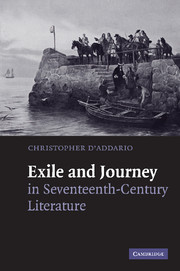Book contents
- Frontmatter
- Contents
- Acknowledgments
- Introduction: The “remanence” of the past: the early modern text in exile
- 1 Nostalgia and nationalism in New England literature
- 2 Exile and the semantic education of Thomas Hobbes's Leviathan
- 3 The expulsion from Paradise: Milton, epic and the restoration exiles
- 4 Sybil's leaves: Dryden and the historiography of exile
- Epilogue
- Notes
- Index
2 - Exile and the semantic education of Thomas Hobbes's Leviathan
Published online by Cambridge University Press: 22 September 2009
- Frontmatter
- Contents
- Acknowledgments
- Introduction: The “remanence” of the past: the early modern text in exile
- 1 Nostalgia and nationalism in New England literature
- 2 Exile and the semantic education of Thomas Hobbes's Leviathan
- 3 The expulsion from Paradise: Milton, epic and the restoration exiles
- 4 Sybil's leaves: Dryden and the historiography of exile
- Epilogue
- Notes
- Index
Summary
After the restoration, and back in the favor of Charles II, Thomas Hobbes dedicated his optical treatise Seven Philosophical Problems (1661) to the king, his former mathematics student and fellow exile. In the closing periods of this dedication, Hobbes apologetically reflects on the reception of his political work, particularly Leviathan:
There is therefore no ground for so great a calumny in my writing. There is no sign of it in my life; and for my religion, when I was at the point of death at St. Germain's, the Bishop of Durham can bear witness of it, if he be asked. Therefore I most humbly beseech your sacred Majesty not to believe so ill of me upon reports, that proceed often, and may do so now, from the displeasure which commonly ariseth from difference in opinion; nor to think the worse of me, if snatching up all the weapons to fight against your enemies, I lighted upon one that had a double edge.
Hobbes, first of all, reminds the king that he also was in exile once, citing his particular troubles in France in the late 1640s, and using it as a sign of his supposed continuous loyalty to the Anglican and royalist cause. The final clause is delicately calibrated, wistful yet poised, apologetic yet uncompromising. The metaphor implicitly evokes the desperate and scattered existence of exile, while also admitting the diverse ways in which the works of royalist exiles could be used during the early 1650s.
- Type
- Chapter
- Information
- Exile and Journey in Seventeenth-Century Literature , pp. 57 - 86Publisher: Cambridge University PressPrint publication year: 2007



